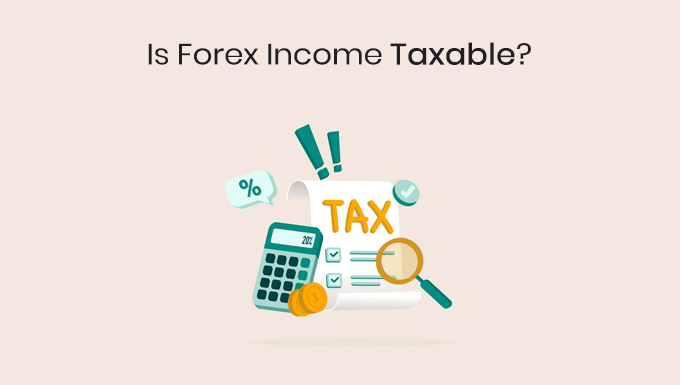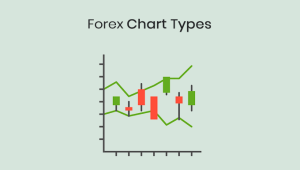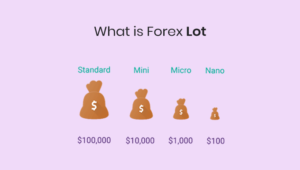Forex trading has gained immense popularity over the years, with many individuals entering this financial market for both primary and supplementary income. One pertinent question that many traders grapple with is, “Is forex income taxable?” The answer isn’t straightforward like many other financial queries. Let’s get into the various aspects of forex income and its taxation.
Table of Contents
• Difference Between Forex Trading Gains: Capital Gains vs. Income
• Forex Taxation in Different Jurisdictions
• Tax Treatment for Forex Traders vs. Forex Investors
• How to Report Forex Income on Your Tax Returns
• Potential Deductions for Forex Traders
• Tax Benefits for Forex Traders
• Common Forex Taxation Mistakes
• Conclusion
• FAQs
Basics of Forex Income Taxation
Forex trading, for many, represents an opportunity to earn significant returns. However, it’s essential to understand how these earnings are viewed from a taxation perspective.
To begin, it is important to recognize that forex earnings are, in most jurisdictions, subject to taxation. Just like income derived from other investments, profits and losses from forex trading have their tax consequences.
However, the specific manner and rate at which these earnings are taxed can vary. Several factors come into play, such as the trader’s residency, the nature of the trades (short-term vs. long-term), and the amount of income earned.
Additionally, forex trading isn’t always straightforward. There are different types of forex contracts, such as spot contracts, forward contracts, and futures contracts, and the tax implications for each can differ.
It is, therefore, crucial for forex traders to familiarize themselves with the tax regulations in their respective countries. Consulting a tax professional can ensure that they remain compliant and avoid potential legal complications.
Understanding Forex Income
Forex income refers to the gains made from trading currencies in the foreign exchange market. These profits can be either from capital appreciation or from earning interest on trades. The manner in which this income is taxed largely depends on its classification: is it a regular income or a capital gain?
Forex Trading as a Business vs. Personal Investment
The manner in which you approach forex trading can influence how it’s taxed. If you’re trading frequently, making a living out of it, tax authorities might view this as a business income. Conversely, occasional trades might be seen as personal investments, affecting the way they’re taxed.
Spot vs. Forward Contracts
The nature of your forex contracts can also impact taxation. Spot contracts, where trades are settled immediately, can be treated differently from forward contracts, which settle at a future date. Each has its own tax implications.
Common Tax Deductions
While forex income might be taxable, traders can often claim various deductions. These can range from trading software subscriptions, memberships to professional bodies, or even home office expenses, depending on the jurisdiction.
Difference Between Forex Trading Gains: Capital Gains vs. Income
The nature of your forex earnings plays a key role in determining how they are taxed. Broadly speaking, forex gains can be categorized into two types: capital gains and income.
Capital gains refer to the profits earned when a forex trader buys a currency pair and then sells it at a higher price. Depending on the duration of the investment, these can be classified as either short-term or long-term capital gains, each with its tax rate.
On the other hand, forex gains can also be treated as income, especially for those who trade frequently. Such traders might be viewed by tax authorities as running a business, and their gains are thus treated as business income.
The distinction between capital gains and income in the forex world can sometimes be blurry. It is essential for traders to understand how their trading activities are viewed by tax authorities.
For instance, a person who trades occasionally might have their earnings classified as capital gains. But a trader executing numerous trades daily might be treated as a business, with profits taxed as income.
This distinction can significantly impact the amount of tax payable. Typically, business income might be subject to higher tax rates compared to capital gains, especially long-term ones.
Forex Taxation in Different Jurisdictions
Different Countries, Different Rules…
Every country has its own set of tax regulations concerning forex income. This section examines the variance in tax policies across different jurisdictions.
- USA: In the US, forex traders can opt for two different methods of taxation. The default method sees forex gains and losses as ordinary income. However, traders can also opt for Section 1256, where they’re taxed on 60% of their gains at long-term capital gains rates and 40% at short-term rates.
- UK: In the United Kingdom, forex trading can either be considered spread betting or CFD (contracts for difference) trading. Spread betting is generally tax-free, while CFDs are subject to capital gains tax.
- Australia: The Australian Tax Office classifies forex income under Capital Gains Tax. But, similar to the UK, frequent traders might find their earnings classified as ordinary income.
- Canada: Forex income in Canada is generally treated as capital gains. Only half of the gain is taxable. However, frequent trading might lead the Canadian Revenue Agency to view this as business income.
- Other Countries: Taxation policies can vary significantly from one country to another. It’s crucial for traders to familiarize themselves with their local tax regulations or consult with a tax professional.
It’s paramount to understand the specific rules of your country and perhaps consult a tax professional for detailed advice.
Forex trading happens on a global scale, and thus, the tax implications can vary widely depending on the jurisdiction.
Each country has its own tax code and regulations concerning forex earnings. For example, in some countries, forex gains are treated as capital gains, while in others, they might be treated as regular income.
Furthermore, the duration of the investment can influence tax treatment. Some countries offer preferential tax rates for long-term investments, while short-term trades are taxed at a higher rate.
Tax treaties between countries can also impact how forex gains are taxed. For instance, a trader residing in one country but earning forex income in another might be subject to double taxation. However, tax treaties can help alleviate such scenarios.
To navigate this complex landscape, traders must stay updated with tax regulations in their home country as well as in countries where they have significant trading activities.
Tax Treatment for Forex Traders vs. Forex Investors
At first glance, forex traders and investors might seem similar. However, from a taxation perspective, they can be viewed differently.
Forex traders are individuals who engage in frequent trading activities, seeking to profit from short-term market fluctuations. Given their volume and frequency of trading, they might be treated as running a business. Hence, their forex gains might be taxed as business income.
Forex investors, on the other hand, usually adopt a longer-term approach. They hold onto their forex positions for extended periods, aiming to benefit from long-term trends. Their gains are more likely to be categorized as capital gains.
This distinction impacts not just the tax rate but also the ability to claim deductions. For instance, a forex trader might be able to deduct trading-related expenses, such as platform fees or research costs, from their taxable income.
It’s also worth noting that some jurisdictions offer a choice in how forex earnings are reported. In such cases, traders and investors should evaluate which method is more tax-efficient for their situation.
How to Report Forex Income on Your Tax Returns
Correctly reporting forex income on tax returns is essential to ensure compliance and avoid potential penalties.
Record-Keeping is Key
Regardless of how your forex income is taxed, one thing is consistent: the importance of proper record-keeping.
Firstly, traders should maintain detailed records of all their forex transactions. This includes the date, amount, currency pairs involved, and the profit or loss from each trade.
In many jurisdictions, forex traders are required to report their gains and losses on specific tax forms. For instance, in the U.S., forex traders might use Form 6781 and Schedule D for this purpose.
For those who treat forex trading as a business, they may need to report their earnings as business income. This might involve additional forms and detailing business-related expenses that can be deducted.
It’s also crucial to be aware of the deadline for tax reporting. Missing the deadline can result in penalties or interest on unpaid taxes.
Given the intricacies of forex taxation, using tax software or consulting a tax professional can be invaluable. They can guide traders through the reporting process, ensuring accuracy and compliance.
Potential Deductions for Forex Traders
Tax deductions can significantly reduce the tax burden for forex traders. By understanding and leveraging these deductions, traders can optimize their tax situations.
Typically, expenses directly related to forex trading can be deducted. This includes costs like trading software subscriptions, educational courses, and research materials.
Additionally, if a trader uses a dedicated space in their home for trading, they might qualify for a home office deduction. This would allow them to deduct a portion of their rent or mortgage, utilities, and other related expenses.
For those who have taken out loans to fund their trading activities, the interest on such loans might be deductible. However, it’s essential to ensure that the borrowed funds were used exclusively for trading.
It’s also worth noting that if a trader incurs losses in their trading activities, these losses might offset other taxable income. This can reduce the overall tax liability for the year.
However, there are often limits to how much can be deducted or offset. For instance, some jurisdictions have a cap on how much trading loss can be offset against other income.
Tax Benefits for Forex Traders
Many jurisdictions offer tax benefits and incentives to forex traders. Here’s a glance at some common tax breaks available.
Claiming Losses
Most countries allow traders to claim their forex trading losses against other income, reducing the overall taxable amount. This is particularly beneficial for new traders who might face initial losses.
Intraday Trading Benefits
Some jurisdictions offer specific tax benefits for intraday traders, provided they meet certain criteria. These benefits can include reduced tax rates or specific deductions.
Long-Term Trading Incentives
Long-term forex traders might benefit from reduced tax rates in some countries. This is to incentivize holding onto trades for more extended periods.
Special Tax Schemes
A few countries introduce schemes or programs catering specifically to forex traders. These can range from tax holidays to reduced rates for a certain period.
Retirement Account Benefits
Some countries allow forex trading within tax-advantaged retirement accounts. Profits within these accounts can grow tax-free or be taxed at a significantly reduced rate.
Common Forex Taxation Mistakes
Mistakes in reporting forex income can lead to hefty penalties. Here are some common pitfalls traders should avoid.
Not Reporting Forex Income
Ignorance isn’t bliss when it comes to taxes. All forex income, irrespective of the amount, should be reported.
Incorrect Classification of Income
Misclassifying forex income (e.g., capital gain vs. ordinary income) can lead to miscalculations and discrepancies in filed returns.
Overlooking Deductions
Many traders miss out on potential deductions that could reduce their taxable income. It’s crucial to claim all legitimate expenses related to forex trading.
Inaccurate Record-Keeping
Inconsistencies in transaction records can raise red flags for tax authorities, leading to potential audits or penalties.
Not Seeking Professional Advice
Assuming or guessing tax implications without professional advice can be detrimental. When in doubt, consult.
Conclusion
Navigating the complexities of forex income taxation can seem challenging. However, with the right knowledge, tools, and professional advice, traders can ensure compliance while optimizing their returns. As the forex market continues to evolve, staying updated with tax regulations becomes imperative for financial success.
FAQs
1. Are swaps and rollovers in forex trading taxable?
Swaps and rollovers are mechanisms in forex trading that allow traders to extend their trading position to the next trading day. The tax treatment for these can differ depending on the jurisdiction and might be subject to specific rules.
2. What happens if I trade with a forex broker based in another country?
Trading with an overseas broker can have its own set of tax implications. While the profits or losses you make will still be subject to your home country’s tax regulations, there may be additional considerations for repatriating funds or withholding taxes levied by the broker’s country.
3. How are forex trading losses treated for tax purposes?
Forex trading losses can sometimes be used to offset other taxable income. However, there are typically limits on how much can be offset, and certain conditions must be met. It’s crucial to understand the specific rules around claiming trading losses in your jurisdiction.
4. Are forex trading courses and training deductible?
The deductibility of forex trading courses and training can vary. In some jurisdictions, if you’re trading as a business, these educational expenses might be considered necessary for the business and, therefore, deductible. However, for individual traders, this may not always be the case.
5. If I trade part-time while having a full-time job, how does this impact my tax?
Part-time trading will typically not exempt you from paying taxes on your forex gains. You’ll need to declare your earnings as additional income alongside your primary job’s income. The specific treatment may vary, but it’s crucial to report all sources of income accurately.






